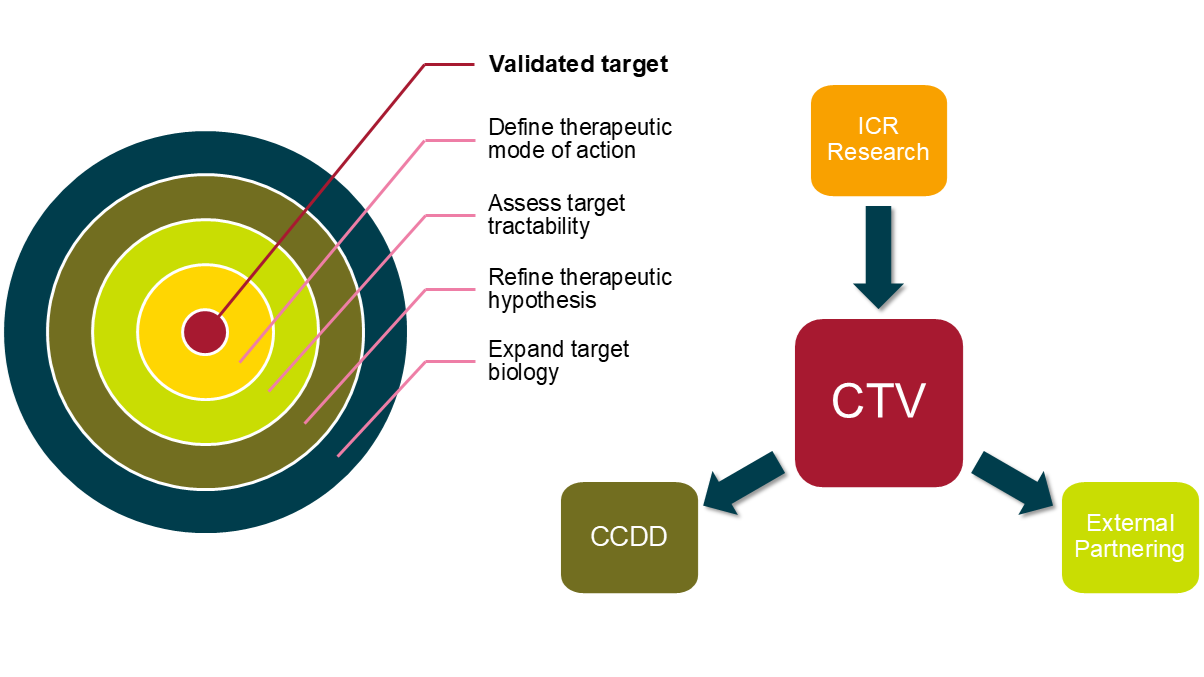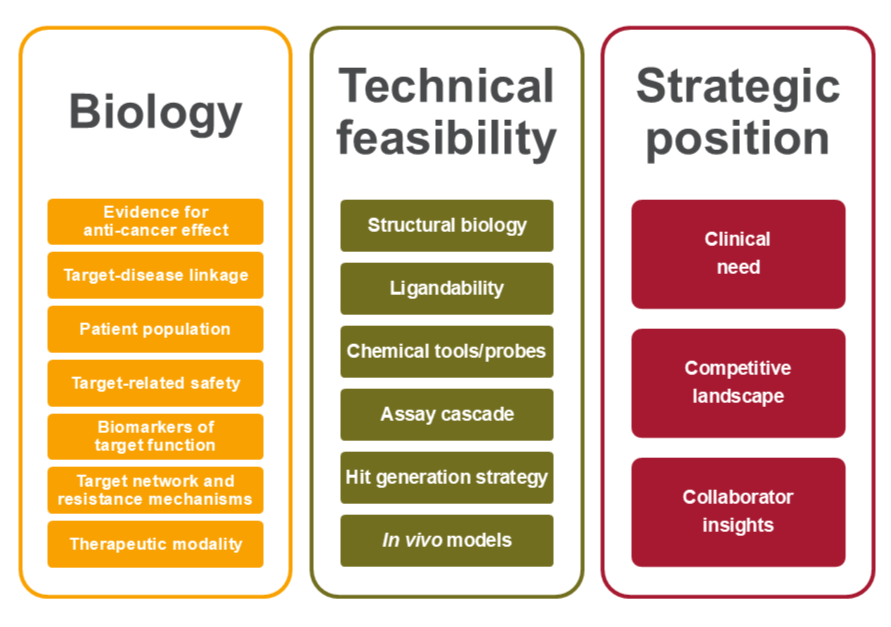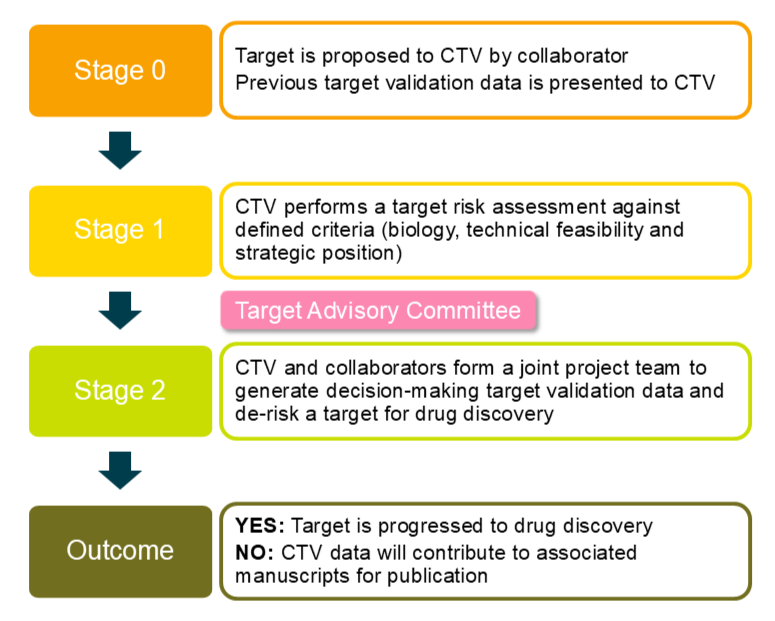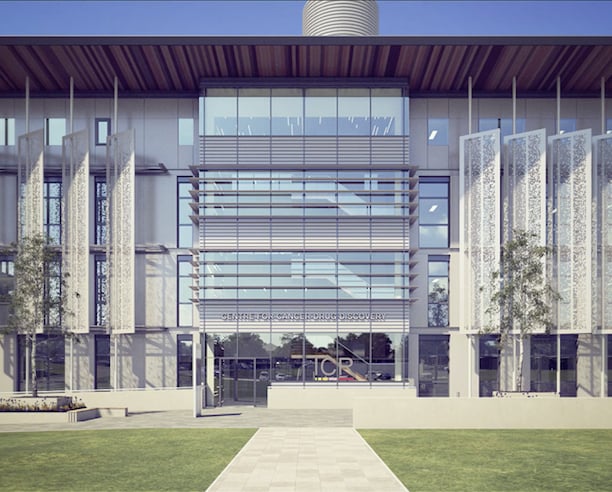The Centre for Target Validation
The Centre for Target Validation (CTV) is a multidisciplinary and collaborative research centre that streamlines the connection between cancer science and drug discovery at the ICR.
How we research at this centre
Our centre’s focus is to build robust target validation data packages against potential cancer targets identified by the ICR's researchers across Divisions. This is to increase confidence in the launch of drug discovery projects against those targets.
Our scientists collaborate with ICR researchers to expand on the target biology validation and build a strong therapeutic hypothesis for a target. Tractability of targets is assessed and the most appropriate therapeutic mode of action for a target will be defined.
Drug discovery projects against robustly validated targets will be launched either within the ICR’s Centre for Cancer Drug Discovery (CCDD) or with external partners.

Director (interim)
Dr Olivia Rossanese, Head of Division of Cancer Therapeutics and Group Leader
Deputy Director
Dr Joanna Loizou, Group Leader, Division of Cancer Therapeutics and Division of Breast Cancer Research
Lead Biologist
Dr Michael (Mike) Bright, Staff Scientist
Mike joined the ICR as a Postdoctoral Training Fellow in 2011 and has since contributed to a range of target identification, validation, and drug discovery projects across a broad set of cancer types. Mike leads collaborative multidisciplinary target validation projects encompassing computational biology using multi-omics for target identification and patient stratification, in vitro experimental biology, target tractability, assay development and assessment of strategic position for novel therapeutics. As a founding member of the CTV, Mike spearheaded the development of target validation working practices and has progressed a portfolio of potential targets toward drug discovery. Mike is lead biologist in the Centre, and his team generates high quality, robust biology data to empower drug discovery decision-making.
Lead Chemist
Dr Vassilios (Vass) Bavetsios, Senior Staff Scientist
Vass is a Senior Staff Scientist in the Centre for Cancer Drug Discovery and the Centre for Target Validation at the ICR. He carried out his undergraduate studies in Chemistry at University of Ioannina, Greece, obtained a MSc in Chemical Research at King’s College London, and a PhD in medicinal / organic chemistry at The Institute of Cancer Research, University of London. He holds a CMI Level 3 Certificate in Principles of Management and Leadership. His research has been concerned with the design and synthesis of small molecule cancer therapeutics and he has led the chemistry component of several multidisciplinary drug discovery projects. Vass played a significant role in the discovery of compounds that have progressed into clinical trials including the alpha-folate receptor targeted thymidylate synthase inhibitor Idetrexed (CT900, BGC945) and the dual FLT3/Aurora kinase inhibitor EP0042 (CCT241736). He contributed to an ICR collaborative drug discovery programme which was ultimately licensed to AstraZeneca leading to the discovery of Capivasertib, an FDA approved anticancer agent. He has published over 50 papers and is an inventor on 14 patents.
Project Manager
Dr Iona Black, Scientific Project Manager
Iona joined the ICR in 2018, following completion of an MSci in Medicinal Chemistry at the University of Glasgow, which included a 1-year industrial placement at Redx Pharma. Iona obtained her PhD from the ICR in 2023, which focused on the development of chemical tool compounds to inhibit the non-catalytic scaffolding functions of tankyrase, and provided her with an understanding of the drug discovery process for cancer therapeutics. She then joined the Centre for Target Validation in 2023 as a Scientific Project Manager, to provide scientific and operational support to projects within the CTV and the Centre for Cancer Drug Discovery. Iona has contributed to establishing the working practices and collaboration process within the CTV.
Biology
Kate Swabey, Higher Scientific Officer
Kate joined the ICR in 2008, in the Translational Molecular Oncology Team, focusing on the PI3K/AKT/mTOR and VHL/HIF pathways in kidney and prostate cancer. She then moved to the Signal Transduction and Molecular Pathology Team in 2010, where her research focused on the PI3K pathway in ovarian cell lines. Kate then had a defining role in programmes targeting Wnt signalling in the RNA Biology and Molecular Therapeutics Team. Kate joined the Centre for Target Validation in May 2024 and will contribute to the generation of robust biology data for target validation projects.
Biology
Dr Hannah Elcocks, Higher Scientific Officer
Hannah joined the Centre for Target Validation, and the ICR, in September 2024. Hannah completed her PhD at the University of Liverpool, investigating the increased incidence of melanoma in Parkinson’s disease patients. After completing her PhD, Hannah stayed at the University of Liverpool to complete a post-doc, identifying novel E3 ligases regulating basal and induced mitophagy pathways. Hannah completed her second post-doc at Oregon health and sciences university in the US investigating E3 ligases that mediate the host response to legionella infection. Hannah joined the ICR when she returned to the UK and will contribute to the generation of robust biology data for target validation projects.
Biochemistry
Dr Edgars Polovinkins, Higher Scientific Officer
Edgar joined the Centre for Target Validation in June 2024. He completed his PhD in Biomedical Science at the University of Warwick, which included two years of research at the A*STAR Institute in Singapore. Edgar is responsible for recombinant protein production and purification, structural validation, and biophysical characterisation for targets in the CTV portfolio.
In Silico Chemistry
Dr Ewa Wieczorek, Postdoctoral Training Fellow
Ewa joined the ICR in October 2024 as a Postdoctoral Training Fellow. She completed her undergraduate biochemistry degree at the University of Oxford, which included a master's project focusing on the design of USP7 binders. Ewa then stayed in Oxford to study for a PhD under the supervision of Prof Fernanda Duarte and Prof Paul Brennan, where she focused on developing computational methods for synthesis planning and synthesisable molecule generation. In the CTV, Ewa contributes to the projects by carrying out in silico analysis of the targets, including ligandability and structural assessments.
In Silico Chemistry
Dr Andrea Scarpino, Principal Computational Scientist
Andrea joined the ICR in July 2021 as a Postdoctoral Training Fellow. He previously received a Marie Skłodowska-Curie fellowship to work in the Medicinal Chemistry Team at the Research Centre for Natural Sciences in Budapest, where he completed his PhD focusing on the development of covalent docking protocols for drug discovery. Andrea provides computational chemistry support to several drug discovery projects at the ICR and is currently leading the research activities of the In Silico Medicinal Chemistry team. Andrea contributes to research projects in the Centre Target Validation by carrying out in silico ligandability and structural assessments of targets in the CTV portfolio.
Computational Biology
Dr Konstantinos (Costas) Mitsopoulos, Staff Scientist – Bioinformatics
Costas joined the ICR as a Bioinformatics Staff Scientist in 2007, following an MRes in Bioinformatics (Birkbeck), a PhD in Membrane Protein Assembly (Sussex University), and four years of post-doctoral experience in cancer cell biology (KCL). He has been working in the CCDD (formerly CTU) since 2013, providing bioinformatics support to several drug discovery projects. He is currently leading the research activities in the Computational Biology and Chemogenomics Team. His contributions to the CTV focus on in silico target prioritisation. To do this, Costas uses high throughput target ligandability assessments based on 3D structure and available chemical matter, objective assessments of synthetic lethality opportunities in cell line models, druggable disease networks based on patient profiles, as well as structural bioinformatics-driven mutational evaluation of target ligandable cavities, and discovery of degron motifs for molecular glue target candidates.
Research objectives and themes
Research at the Centre for Target Validation is focused on applying best practice in target validation and implementing innovative technology to robustly validate targets for drug discovery.
Research at the Centre for Target Validation is focused on applying best practice in target validation and implementing innovative technology to robustly validate targets for drug discovery.

Who we work with
Scientists in the CTV will form collaborations with ICR researchers who have identified potential therapeutic targets to:
- Provide access to resources and core facilities to answer hypothesis-testing questions
- Generate the key decision-making data required for target to enter drug discovery
The Centre for Target Validation therefore links the Centre for Cancer Drug Discovery within the Division of Cancer Therapeutics with partner Divisions that identify potential drug targets. The Centre is also in collaboration with the Division of Breast Cancer Research to validate targets relevant in breast cancer in the context of the Breast Cancer Now (BCN) Toby Robins Research Centre.
The CTV is supported and funded by the ICR as part of the ICR research strategy: Defeating Cancer to transform the lives of cancer patients.
Collaborate with us
The CTV is set-up to facilitate collaborations between researchers investigating target biology, with our researchers who have expertise in target validation and drug discovery. Our scientists collaborate with researchers who have identified potential anti-cancer targets, to put those targets on the pathway to drug discovery projects (within CCDD or external partners).
The Centre provides a clear and efficient process for translation of ICR discoveries into drug discovery projects, which is outlined in the Centre’s roadmap.
Joint project teams will be formed between the CTV and our collaborators with the following aims:
- Assess target tractability and define therapeutic mode of action
- Expand on the target biology and further refine the therapeutic hypothesis
- Generate broad, robust target validation data for decision making
- Identify model systems, biomarkers and assays for drug discovery

Benefits of working with the CTV
Data generated will benefit our collaborators target biology research efforts, and will provide a robust pipeline of validated targets to the CCDD for drug discovery:
Benefits to ICR researchers
- Robust target validation biology
- Additional resource to further develop target hypotheses
- Access to expertise, technology and equipment within the CTV/CCDD
- Additional research tools generated during target validation phase
Benefits to CTV/CCDD
- Robust pipeline of validated targets for drug discovery
- Closer alignment / integration of CCDD to ICF researchers
- Built-in collaborator/expert to support discovery of validated targets
- Jumpstart to drug discovery projects with reagents and tools generated
Contact us
If you have data supporting a new therapeutic target, we want to hear from you!
Contact us to get started. We can help put your target on the path to the clinic.
To contact us, please email:
Where to find us
Centre for Target Validation
Centre for Cancer Drug Discovery
The Institute of Cancer Research
15 Cotswold Road
SM2 5NG Sutton, London
United Kingdom
